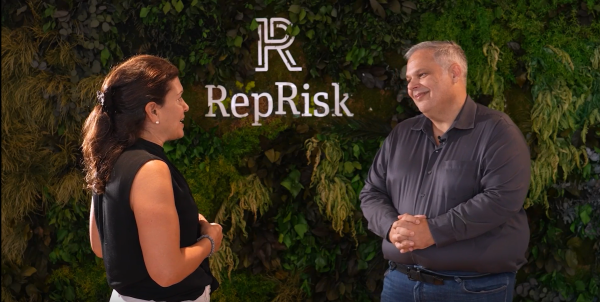# RepRisk interviews Andrew Pitts-Tucker, Managing Director at Apex ESG Ratings and Advisory
1. RepRisk: Please provide some insight into your specific role at Apex ESG Ratings and Advisory (Apex) and explain the work that you and your team do.
Andrew Pitts-Tucker: I am the Managing Director at Apex ESG Ratings and Advisory, with specific responsibility to drive the Group’s strategic ESG development. I spent 25 years in the financial industry before following my passion of wildlife conservation. I spent three years developing sustainable business models for protected area landscapes and wildlife conservation initiatives in Sub-Saharan Africa. My work in conservation taught me valuable lessons and eventually inspired my move back to financial services to focus on my passion of conservation through ESG. My team and I have developed a consolidated, best-in-class data set powering simple-to-use, intuitive software. We compare data provided by the company with that of a number of leading global standards, and we highlight gaps in order to make recommendations to close those gaps.
As of March 2021, the Sustainable Finance Disclosure Regulation imposes mandatory ESG disclosure obligations for asset managers, private banks, and other financial market participants. Significant action is going to be needed to comply. Regulation is a driving force, but to really differentiate yourself and be ahead of the pack, you must show that you’re doing it for reasons over and above legislated requirements. Our products and services help our clients make better and more informed investment decisions, and in turn do their part for people and our planet.
2. RR: RepRisk and Apex entered into a partnership at the end of last year to deliver ESG data to private markets. Why did you choose to partner with RepRisk and how does RepRisk data support your clients?
APT: Apex provides a unique solution for accessing and understanding what private companies are truly doing in terms of ESG. We collect the data first-hand from the companies and benchmark it against best-in-class standards, sector peers, and performance over time. To complement our solution, RepRisk provides a comprehensive view of what hundreds of thousands of public sources from international media to local NGOs – analyzed daily in 30 languages for early risk detection – say a private company is doing in terms of ESG. Together, Apex and RepRisk deliver the most unique and comprehensive view of the ESG performance of a private company from both the inside-out and the outside-in.
3. RR: In your view, what value can ESG data bring to private markets and what are the main challenges when integrating ESG data?
APT: ESG data is invaluable for understanding and evaluating the performance of a company in its entirety. There are three burning issues when it comes to data: What data is needed? How can that data be collected? And how do we convert that data into positive action? On the one hand, that means a better understanding of its impact on people and planet; on the other hand, it can indicate areas of strength or weakness in the face of changing supply, demand, and regulatory pressures as the world transitions towards a sustainable economy.
4. RR: Compared to public markets, adoption of and disclosure on ESG issues for private assets has been infrequent and slow – fewer than 10% of global private equity firms have signed up to the UNPRI. In your opinion, what is the role of private markets in addressing today’s challenges and achieving a more sustainable future through better capital allocation?
APT: Fundamentally, trillions of dollars are invested in the private markets and private companies are crucial to driving change. With this sheer scale, private equity firms are in a unique position compared to public markets, in that they often hold stakes enabling them to influence significant behavioral change. Providing them with the tools to access and understand better ESG data is the key to allowing them to do their job to the best of their abilities and improve the value of these companies, both financially and for a sustainable future.
5. RR: How have your conversations about ESG changed over the last few years, both internally (e.g. with senior management or investment teams) and externally (e.g. with your clients or other stakeholders)?
APT: ESG has gone from a ‘nice to have’ to a ‘need to do’ in relatively short order. The pressures and trends that have driven, and continue to encourage, this development come from employees, consumers, investors, and regulators. None of those groups are going to row back from this point and the acceleration is clear both in terms of ESG’s importance and sophistication.
6. RR: What developments do you see on the horizon for private markets around ESG and what is in store for Apex in the near future?
APT: Although there are too many to mention in full, one key element we see is greater consolidation around what ESG data should be disclosed and how it should be evaluated. There is an accelerated process of consolidation across key standards and regulations, as well as stakeholder requirements – from auditors to investors. Apex was ahead of the curve in this respect, we have focused on consolidating, rather than complicating, the ESG universe for our clients by aggregating the leading standards and regulations into single-source datasets. As those standards and regulations continue to evolve, with more and more quantitative data and rigor inevitable, our clients benefit from us updating our datasets so that they are always at the front of the pack. We are pleased to partner in this effort with RepRisk, who have a time-tested and transparent methodology in place.
Conclusion
Apex ESG Ratings and Advisory offers a consolidated, best-in-class dataset powering simple-to-use, intuitive software. Comparing data provided by the company with that of leading global standards, they highlight gaps to make recommendations to close those gaps. Apex leverages RepRisk reputational and business conduct risk data to provide a 360-degree view of private companies: RepRisk’s unrivaled, comprehensive dataset – generated by a unique combination of AI, machine learning, and human intelligence – excludes company self-disclosures, looking at what the world says about a company, not what a company says about itself. This complementary combination of company selfdisclosures and RepRisk’s outside-in approach provides Apex clients with the data needed to make better and more informed investment decisions and do their part for people and our planet.
Bio – Andrew Pitts-Tucker
Andy has over 24 years of experience in the financial markets sector, most recently running the global distribution platform in the sustainable investments division of Deutsche Asset Management. Having joined Apex in September 2019, Andy has specific responsibility for driving the Group’s strategic ESG development through its subsidiary Apex ESG Ratings and Advisory, and lead the build of a unique, end-to-end ESG data collection, Rating and Reporting service specifically for the private markets. Prior to becoming Managing Director for Apex ESG Ratings and Advisory, Andy spent three years in the wildlife conservation sector developing sustainable business models for protected area landscapes and wildlife conservation initiatives in Sub-Saharan Africa. He is an advisory board member of the charity Tusk Trust and a board member of the Luwire Wildlife Conservancy in Northern Mozambique.



